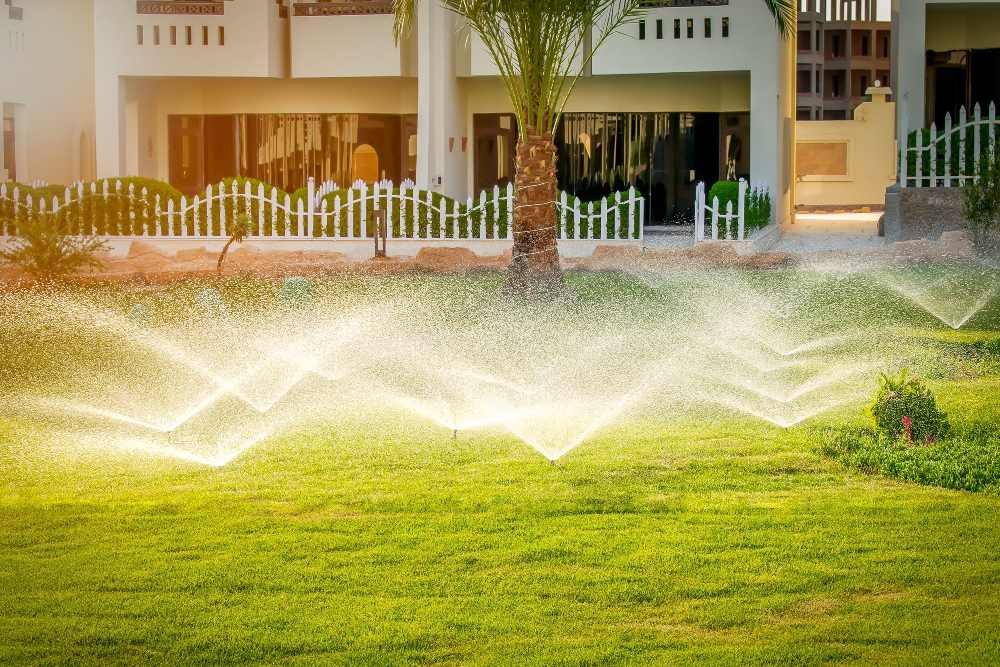Effective irrigation maintenance is crucial for ensuring the health and growth of your plants. Properly installed and maintained irrigation systems provide consistent water supply, reduce waste, and prevent issues such as overwatering or underwatering. This guide will offer comprehensive advice on installing and maintaining efficient irrigation systems to keep your plants thriving.

If you are looking for a professional in Irrigation maintenance in Syracuse, NY, we can help you with your project, contact us.
Understanding Irrigation Systems
Types of Irrigation Systems
- Drip Irrigation: Delivers water directly to the plant roots through a network of tubes, emitters, and valves. Ideal for gardens, flower beds, and individual plants.
- Sprinkler Systems: Distribute water over a wide area, mimicking natural rainfall. Suitable for lawns and larger garden areas.
- Soaker Hoses: Perforated hoses that slowly release water along their length, perfect for rows of plants or garden beds.
- Manual Watering: Using hoses and watering cans for direct watering. Suitable for small gardens or specific plant areas.
Benefits of Efficient Irrigation
- Water Conservation: Reduces water waste by delivering water directly to the plant roots.
- Time Efficiency: Automates watering schedules, saving time and effort.
- Plant Health: Provides consistent moisture levels, promoting healthy plant growth.
Installing an Irrigation System
Planning Your Irrigation System
- Assess Your Landscape: Identify the types of plants, their water needs, and the layout of your garden or lawn.
- Design the System: Plan the placement of emitters, sprinklers, or soaker hoses to ensure even water distribution.
- Water Source: Ensure you have a reliable water source and adequate water pressure to support the system.
Installation Steps
- Gather Materials: Purchase the necessary components, including pipes, emitters, sprinklers, valves, and timers.
- Layout and Dig: Mark the placement of your system on the ground and dig trenches for pipes if necessary.
- Assemble the System: Connect pipes, attach emitters or sprinklers, and install valves and timers.
- Test the System: Run water through the system to check for leaks and ensure proper water distribution.
- Adjustments: Make any necessary adjustments to emitter placement or water pressure.
Maintaining Your Irrigation System
Regular Inspection and Maintenance
- Check for Leaks: Regularly inspect pipes, emitters, and sprinklers for leaks or damage. Repair or replace faulty components promptly.
- Clean Emitters and Sprinklers: Remove dirt, debris, and mineral buildup from emitters and sprinkler heads to ensure optimal performance.
- Monitor Water Pressure: Ensure that water pressure remains consistent. Adjust or install pressure regulators if needed.
- Seasonal Adjustments: Adjust your watering schedule based on seasonal changes and plant needs.
Winterizing Your Irrigation System
- Drain the System: Before the first frost, drain all water from the system to prevent pipes from freezing and cracking.
- Remove and Store Components: Remove and store removable components like timers, hoses, and sprinkler heads in a dry place.
- Insulate Exposed Pipes: Use pipe insulation or foam covers to protect any exposed pipes from freezing temperatures.
Troubleshooting Common Issues
- Uneven Watering: Check for clogged emitters or sprinklers and clean them. Ensure proper placement and spacing of components.
- Low Water Pressure: Inspect the system for leaks or blockages. Adjust water pressure regulators or upgrade the main water supply line if necessary.
- Overwatering or Underwatering: Adjust the watering schedule and emitter flow rates based on plant needs and soil moisture levels.
Tips for Efficient Irrigation
Optimize Watering Schedules
- Early Morning Watering: Watering in the early morning reduces evaporation and allows plants to absorb moisture before the heat of the day.
- Deep and Infrequent Watering: Water deeply but less frequently to encourage deep root growth and drought tolerance.
- Adjust for Weather: Reduce watering during rainy periods and increase during hot, dry spells.
Group Plants by Water Needs
- Hydrozoning: Group plants with similar water requirements together to optimize watering efficiency and avoid overwatering or underwatering.
- Native and Drought-Tolerant Plants: Incorporate native and drought-tolerant plants into your landscape to reduce water needs.
Mulching and Soil Improvement
- Mulch Application: Apply a layer of mulch around plants to retain soil moisture, suppress weeds, and regulate soil temperature.
- Soil Amendments: Improve soil structure and water retention by adding organic matter such as compost or aged manure.
Benefits of Regular Irrigation Maintenance
Healthy Plant Growth
- Consistent Moisture Levels: Regular maintenance ensures that plants receive the right amount of water, promoting healthy growth and development.
- Reduced Stress: Proper irrigation minimizes plant stress caused by inconsistent watering, leading to stronger, more resilient plants.
Water Conservation
- Efficient Water Use: Well-maintained systems use water efficiently, reducing waste and conserving this valuable resource.
- Cost Savings: Efficient irrigation systems lower water bills by minimizing water waste and preventing overwatering.
Enhanced Landscape Aesthetics
- Lush and Vibrant Plants: Consistent irrigation results in lush, vibrant plants that enhance the beauty of your landscape.
- Curb Appeal: A well-maintained garden or lawn adds to the overall curb appeal and value of your property.
Effective irrigation maintenance is essential for ensuring the health and vitality of your plants. By installing an efficient irrigation system and following regular maintenance practices, you can provide consistent water supply, conserve water, and promote healthy plant growth.
Proper irrigation maintenance not only enhances the beauty of your landscape but also contributes to a sustainable and eco-friendly gardening practice. Invest in your irrigation system and enjoy a thriving, lush garden that adds value and enjoyment to your home.
Visit our portfolio for inspiration or reach out for a free irrigation maintenance consultation.
